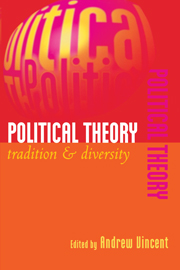Book contents
- Frontmatter
- Contents
- Preface
- List of Contributors
- Introduction
- 1 Political Theory and Conceptual Change
- 2 Political Theory and the Problem of Anachronism
- 3 Utilitarianism as a Public Philosophy
- 4 Rational Choice Political Theory
- 5 Republican Political Theory
- 6 Liberalism, Multiculturalism and Oppression
- 7 Postcolonialism and Political Theory
- 8 Legal Positivism and Political Power
- 9 Political Theory, International Theory, and the Political Theory of International Relations
- 10 Method Matters: Feminism, Interpretation and Politics
- 11 The Political Philosophy of Deleuze and Guattari
- 12 The Object of Political Theory
- Index
4 - Rational Choice Political Theory
Published online by Cambridge University Press: 29 March 2011
- Frontmatter
- Contents
- Preface
- List of Contributors
- Introduction
- 1 Political Theory and Conceptual Change
- 2 Political Theory and the Problem of Anachronism
- 3 Utilitarianism as a Public Philosophy
- 4 Rational Choice Political Theory
- 5 Republican Political Theory
- 6 Liberalism, Multiculturalism and Oppression
- 7 Postcolonialism and Political Theory
- 8 Legal Positivism and Political Power
- 9 Political Theory, International Theory, and the Political Theory of International Relations
- 10 Method Matters: Feminism, Interpretation and Politics
- 11 The Political Philosophy of Deleuze and Guattari
- 12 The Object of Political Theory
- Index
Summary
Rational choice political theory, rcpt henceforth, is the application of the analytic methods and techniques of modern economics to the study of political processes. Its ambitions are twofold. First, it aims to render political science as one aspect of a single over-arching social theory; economics (conceived as the study of markets), politics (conceived as the study of political processes) and rational choice sociology (as, say, represented in the work of James Coleman or the journal Rationality and Society) are all different applications of this theory. Second, it aims to provide a rational basis for the normative assessment of political arrangements in the context of the economist's theory of the state.
These two ambitions correspond to two emergent strands in rcpt. One, from the political science end, is represented by theorists like Ken Shepsle, James Alt, and, rather earlier, Bill Riker (see Alt and Shepsle 1990; Riker 1982). The other strand, from the welfare economics end, is represented by James Buchanan and his ‘constitutional political economy’ group and, to a lesser extent, by theorists like George Stigler and the ‘private interest regulation’ theorists associated with the Chicago School of economics (see Stigler 1982). These two strands have slightly different emphases. The political scientists are, for example, typically more insistent on the ‘positive’ character of their enterprise; they sometimes appear anxious to distance themselves from what is often identified as an ideological cast to the Virginia (Buchanan) and Chicago (Stigler) Schools of ‘public choice theory’ or ‘political economy’.
- Type
- Chapter
- Information
- Political TheoryTradition and Diversity, pp. 89 - 111Publisher: Cambridge University PressPrint publication year: 1997
- 3
- Cited by

